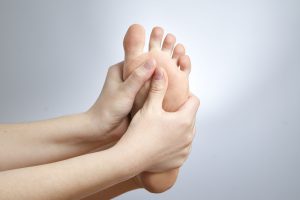Medically Reviewed by Dr. Rachel N. Verville
October 3, 2016
 Plantar Fasciitis is a painful foot condition that slowly develops over time. After an extended period, the tissue supporting the arch on the bottom of your foot – which is called the Plantar Fascia and connects the bone in your heal to the front of your foot – can become weak, swollen, inflamed and irritated. For Frisco patients, this results in the classic pain of Plantar Fasciitis when you stand on your feet or walk, especially first thing in the morning.
Plantar Fasciitis is a painful foot condition that slowly develops over time. After an extended period, the tissue supporting the arch on the bottom of your foot – which is called the Plantar Fascia and connects the bone in your heal to the front of your foot – can become weak, swollen, inflamed and irritated. For Frisco patients, this results in the classic pain of Plantar Fasciitis when you stand on your feet or walk, especially first thing in the morning.
Athletes Are More Prone to Planter Fasciitis
Athletes are more prone to developing Plantar Fasciitis than the average person. This is because of the repetitive movements and stress that athletes place on their feet. In fact, athletes who frequently run and jump, for example, runners, basketball players, baseball players, football players and soccer players, are known by podiatrists to develop Plantar Fasciitis and require treatment. Additionally, athletes with flat feet – who have reduced shock absorption – and athletes with high arches – who have tight Plantar Fascia – are known by podiatrists to be at an even higher risk for developing Plantar Fasciitis.
How Can I Prevent Plantar Fasciitis?
Many Frisco patients ask Dr. Verville what they can do to prevent themselves from developing Plantar Fasciitis. After all, no athlete wants to be sidelined due to a foot injury. Fortunately, with the help of a podiatrist, there are several things you can do to prevent Plantar Fasciitis. The number one thing you can do to prevent Plantar Fasciitis is to wear supportive athletic shoes. Buy new running shoes after you have run about 300 to 500 miles in them, so you can ensure your shoes are still offering you that much-needed support. Off the field, make sure that you wear supportive footwear.
Before any exercise, make sure that you stretch completely. Tight calf muscles have been associated with Plantar Fasciitis. You should always start out new exercise programs slowly, to give your body time to adjust to the new activity. Make sure you train for a new activity before you jump all in. And drink plenty of water before, during and after exercise to stay hydrated.
I Think I Have Plantar Fasciitis. What Do I Do Next?
If you suspect you are experiencing the pain of Plantar Fasciitis, the best thing for you to do is to call our Frisco office and schedule an appointment with experienced podiatrist Dr. Verville. An examination will be performed by Dr. Verville, and a complete treatment program will be prepared for you, which may include:
- Physical therapy to improve your foot’s range of motion.
- Exercises to rebuild mobility and strength in your foot.
- Medication to reduce inflammation in the Plantar Fascia and provide much-needed pain relief.
- In severe cases, surgery may be required.
Don’t endure the pain of Plantar Fasciitis alone. Call Dr. Verville’s Frisco office today to schedule an appointment at 214-385-8822.












